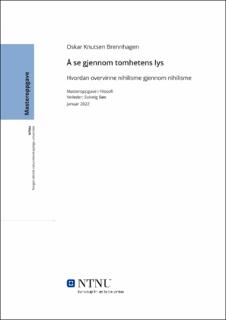| dc.contributor.advisor | Bøe, Solveig. | |
| dc.contributor.author | Brennhagen, Oskar Knutsen. | |
| dc.date.accessioned | 2023-02-10T18:19:13Z | |
| dc.date.available | 2023-02-10T18:19:13Z | |
| dc.date.issued | 2022 | |
| dc.identifier | no.ntnu:inspera:118879173:37273043 | |
| dc.identifier.uri | https://hdl.handle.net/11250/3050120 | |
| dc.description.abstract | Utgangspunktet for denne masteroppgaven er spørsmålet om nihilisme. Hva vil det si å erfare verden som meningsløs? Og på den andre siden: Hva vil det si å erfare verden som meningsfull? Hva er nihilisme, og hva betyr nihilismens problem for oss i vår tid? Dette spørsmålet om nihilisme åpner for et møte mellom østlig og vestlig filosofi gjennom det buddhistisk inspirerte begrepet for tomhet (śūnyatā), slik det blir forstått av Nishitani Keiji i verket Religion and Nothingness. Śūnyatā handler ikke om negasjon, men om et møte med værens absolutte grunnløshet. Gjennom dette møtet med śūnyatā vil tomheten re-kontekstualiseres – ikke som et mørkt vakuum – men som den ontologiske betingelsen for værens gjennomtrengende lys. Ved å lære oss å dvele i tomhetens lys vil væren frigjøres fra vår kategoriske og begrepslige skyggelegging, gapet mellom selvet og verden blir mettet, og tomheten selv vil åpenbare seg som grunnløs og meningsgivende frihet. | |
| dc.description.abstract | The starting point for this master's thesis is the question of nihilism. What does it mean to experience the world as meaningless? And on the other side: What does it mean to experience the world as meaningful? What is nihilism, and what does the problem of nihilism mean for us in our time? This question of nihilism opens a meeting between Eastern and Western philosophy through the Buddhist-inspired concept of emptiness (śūnyatā), as understood by Nishitani Keiji in the work Religion and Nothingness. Śūnyatā is not about negation, but about an encounter with absolute groundlessness. Through this encounter with śūnyatā we will be able to re-contextualize emptiness – not as a dark vacuum – but as the ontological condition of the pervading light of being. By learning to dwell in the light of emptiness, we will be freed from our categorical and conceptual fixations, the gap between self and world will be saturated, and emptiness will reveal itself as groundless and meaningful freedom. | |
| dc.language | nob | |
| dc.publisher | NTNU | |
| dc.title | Å se gjennom tomhetens lys | |
| dc.type | Master thesis | |
